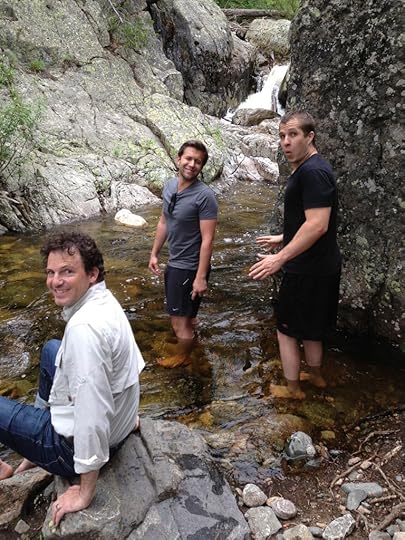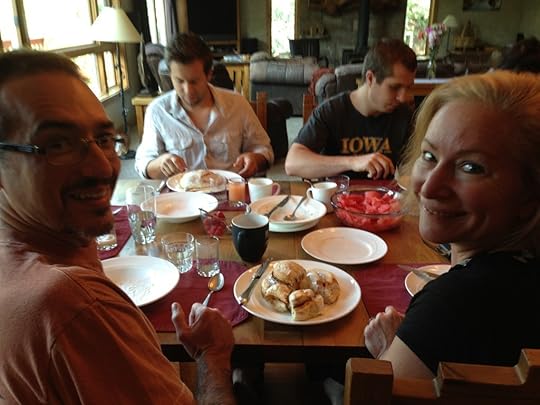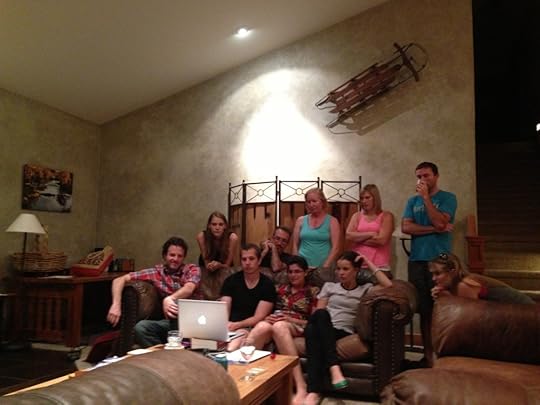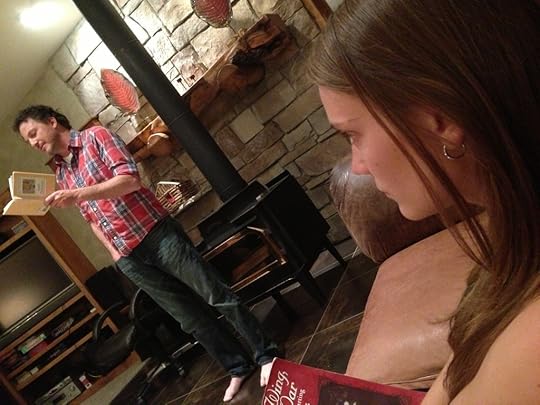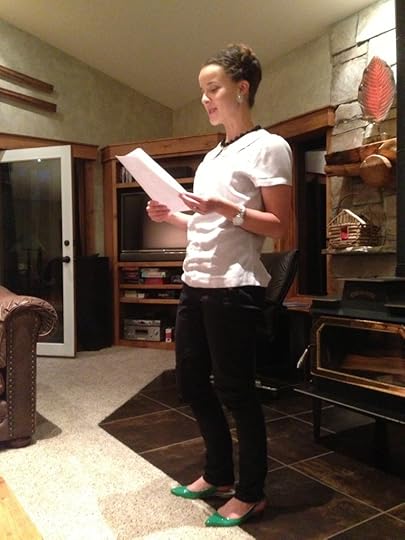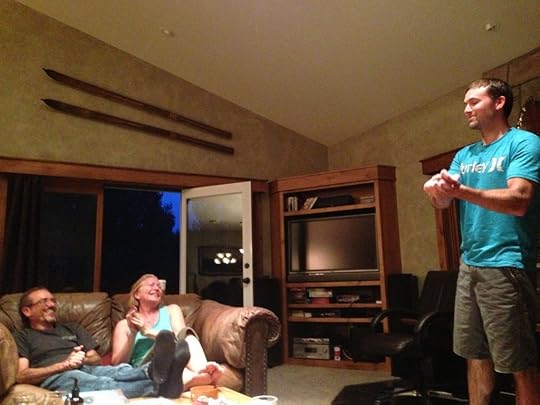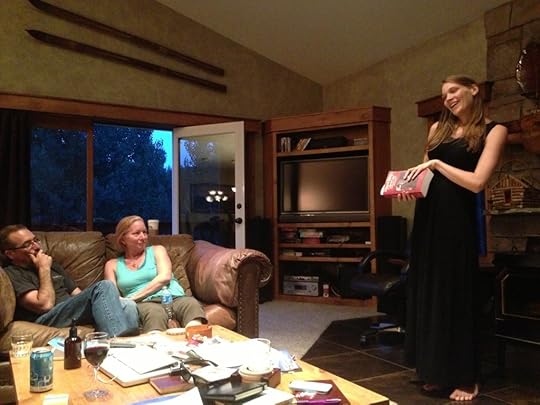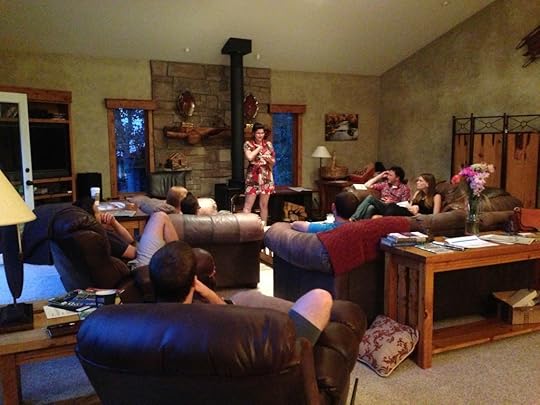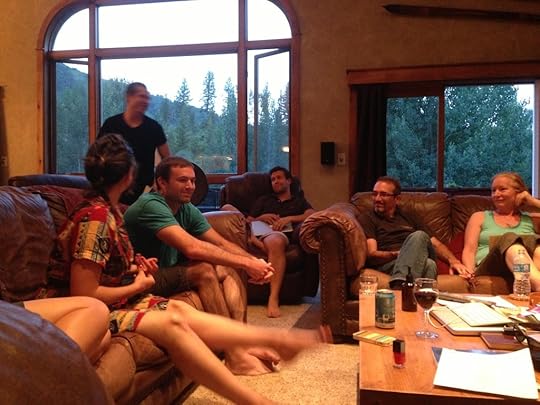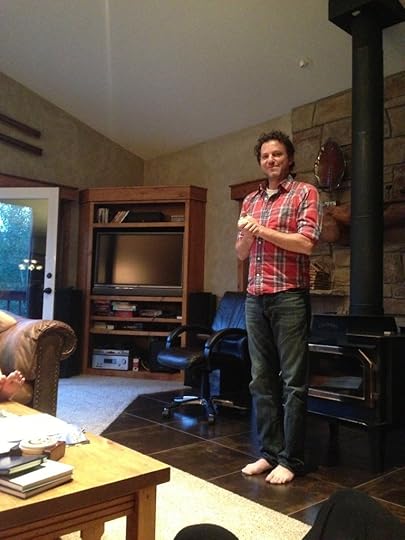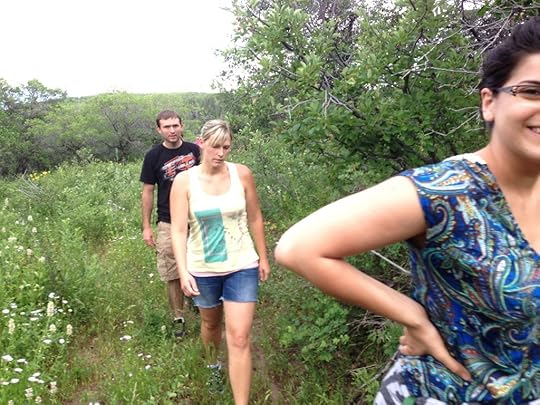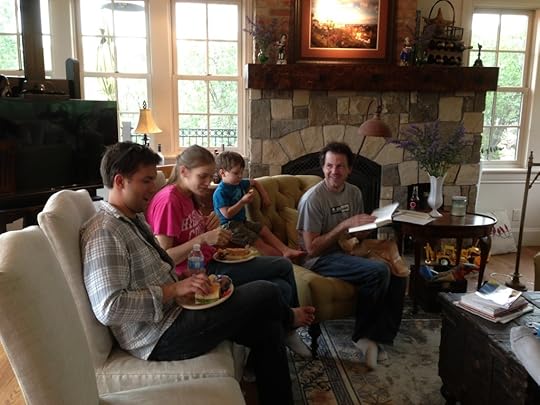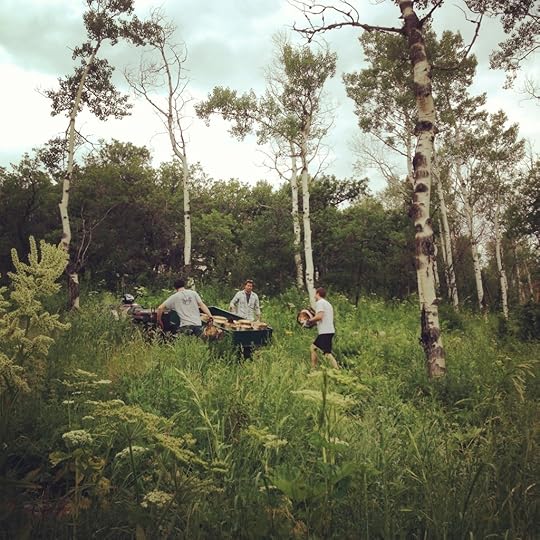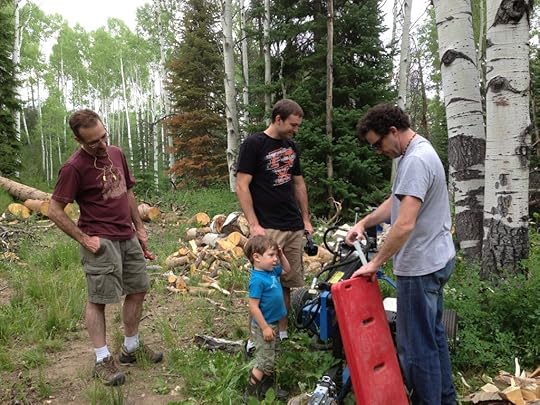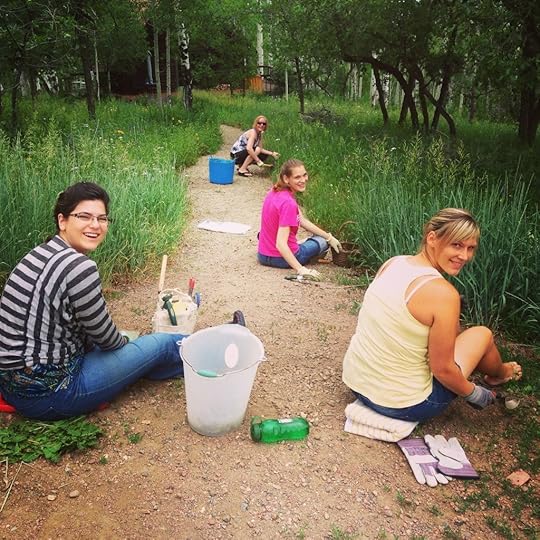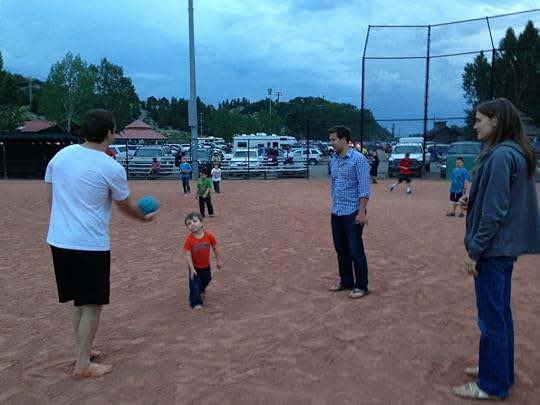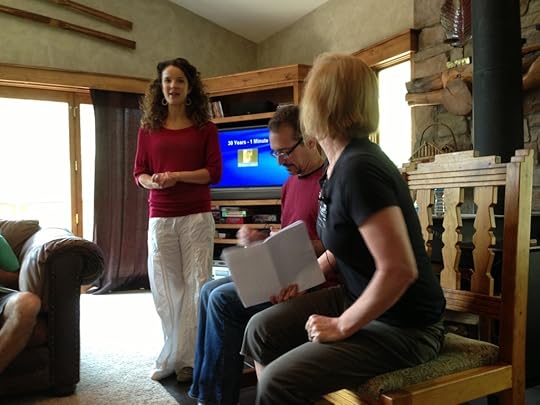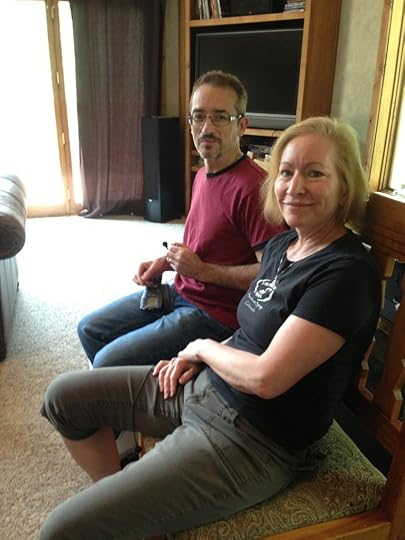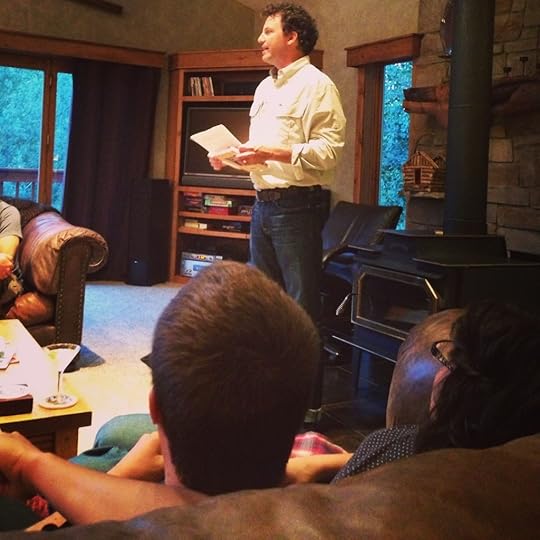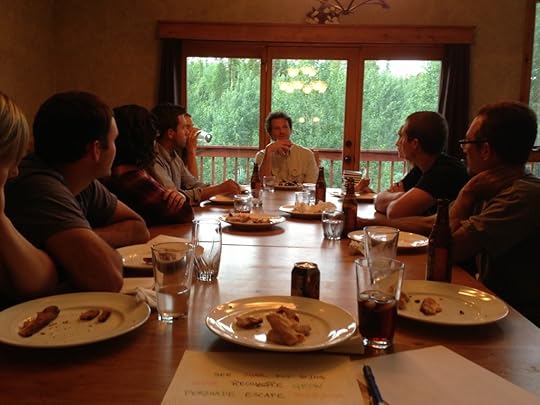Jonalyn Fincher's Blog, page 16
July 10, 2013
S&M Revisited: Pain, Pleasure, and Sex
I made a lentil stew last week which included red chili peppers, a jalapeño, spices sautéed in coconut oil. The final product was spicy enough to cut through the sore throats in my family, hot enough to make my nose run. The pleasure of a biting burn, the satisfaction of a mouth on fire.

Spicy food was the first metaphor a Christian used to explain how a God-honoring couple might enjoy introducing elements of pain into their love-making.
Over a year ago, with the craze for Fifty Shades of Grey, I visited the topic of Sadism/Masochism in “What’s Wrong with S&M?” Through comments from BDSM advocates, I learned S&M was shorthand for the larger kink community of BDSM (a six for four acronym: Bondage, Discipline, Dominance, Submission, Sadism, and/or Masochism). BDSM involves activists such as “spanking, Master/slave role-playing, handcuffs, cages, rape fantasies, razor blades, or all kinds of other things.” (The S&M Feminist: Best of Clarisse Thorn).
In the final sentence of “What’s Wrong with S&M?“, I wrote that I could imagine a couple who could walk BDSM’s razor edge between pleasure and pain to successfully arouse each other without committing abuse, but I had not met them. Over 120 comments later, I can say I’ve met that couple.
Why are you writing about this?
Let me be clear, I am still am very skeptical about how most of the BDSM practices (such as rape fantasies, acts of degradation and humiliation) are good for humans, even consenting adults.
Yet, BDSM asks and answers significant questions most people won’t touch, questions about the role of pain and pleasure in sex, the significance of power and consent. And BDSM has already introduced (shall we call them “borderline”?) activities (handcuffs, spanking, tie-up) into the mainstream. Most sexual conversations are unable to touch the reality of powerplays, grayness of consent, and the knife edge between pleasure and pain that haunts most sexual encounters.
I’ve also noticed that Christians, particularly Christian women, dabble in sadism. Sadism masquerades as purity or holiness among us, but it has the same punishing pleasure. For example, the wife who “uses her sexuality to make her husband feel incompetent and inadequate by subtly beating him down with her sexual demands or sexual rejections. She can make him feel like either a sexual incompetent or a sexual beast; in either case she is punishing him.” (Lewis Smedes, p 43). And this overlaps comfortably with sadism. Christian female sadism is enough for me to prepare myself to ask some serious questions of BDSM.
 But, the main reason I’m writing about BDSM is that of all subcultures, evangelical Christians celebrate a nearly sadistic relationship between their sexual desire and sexual pain. It is the Christian community in evangelical America who have birthed movements designed to starve our sexuality (Every Young Woman’s Battle chapter 13, “A Healthy Starvation Diet”), to maintain emotional purity to the extent of denying our desires and desireability (I Kissed Dating Good-bye), to sustain emotional self-flagellation about our appreciation of beauty in the opposite sex in the effort for godliness, to advocate celibacy instead of fulfillment for any person facing what we deem sexual aberration (LGBTQQI). Christians have a long history of attraction toward inflicting sexual pain for the greater good: perfection.
But, the main reason I’m writing about BDSM is that of all subcultures, evangelical Christians celebrate a nearly sadistic relationship between their sexual desire and sexual pain. It is the Christian community in evangelical America who have birthed movements designed to starve our sexuality (Every Young Woman’s Battle chapter 13, “A Healthy Starvation Diet”), to maintain emotional purity to the extent of denying our desires and desireability (I Kissed Dating Good-bye), to sustain emotional self-flagellation about our appreciation of beauty in the opposite sex in the effort for godliness, to advocate celibacy instead of fulfillment for any person facing what we deem sexual aberration (LGBTQQI). Christians have a long history of attraction toward inflicting sexual pain for the greater good: perfection.
If I want to become fully human, like Jesus was, in my own sexuality, I will need to talk about BDSM.
Good and Bad Pain
I’ve met a Christian man who has openly, kindly and articulately defended the practice of some aspects of the BDSM movement. John Keller* is an ordained pastor, with a Masters of Divinity degree and hails from the evangelical community. Currently he works as an organizational leader for a Christian ministry.
John has agreed to share how BDs (Bondage, Discipline, Domination) may be something a Christian consenting couple could practice with holiness. He will be using theological concepts and some Scripture to both illustrate and defend his position. I will both interview and challenge him.
A word to those commenting:
I look forward to your kindness and respect that you demonstrate to all those who present their arguments at RubySlippers.
John, can you begin by explaining how there exists in God’s world both good pain and bad pain?
First of all, thanks Jonalyn, for the opportunity to dialog with you about the subject of BDSM from a biblical perspective, without imposing an up-front moralistic assessment. I have and continue to appreciate your keen, questioning spirit, and your willingness to touch on matters of sexuality in a gentle, firm, theologically nuanced and yet non-condemning way. Before entering the subject matter of our dialog – Is BDSM wrong? – you’re asking about good and bad pain in general. So let me take a shot at answering your question. Theologically speaking, we cannot assert that pain is always bad and should be avoided at all costs.
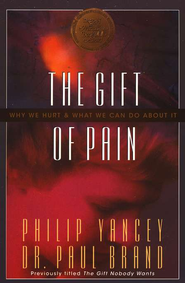 God is not primarily our supernatural pain-reliever, and sin is not the only cause of pain, even though God seeks to lead us into healthy and vibrant relationships with ourselves, others, God and our environment. Paul Brand and Phillip Yancey in their classic, The Gift of Pain, have beautifully illustrated that pain actually is one of God’s great gifts to us. Their conclusion is that pain is an essential requirement for health, an indicator that tells us something is wrong, and why we need pain if we’re to live fully. The absence of pain, according to them, reaps terrible consequences, as illustrated in the lives of the leprosy patients that Dr. Brand treated for many years. In other words, pain can be a friend. Of course, pain can also be a fiend and often is.
God is not primarily our supernatural pain-reliever, and sin is not the only cause of pain, even though God seeks to lead us into healthy and vibrant relationships with ourselves, others, God and our environment. Paul Brand and Phillip Yancey in their classic, The Gift of Pain, have beautifully illustrated that pain actually is one of God’s great gifts to us. Their conclusion is that pain is an essential requirement for health, an indicator that tells us something is wrong, and why we need pain if we’re to live fully. The absence of pain, according to them, reaps terrible consequences, as illustrated in the lives of the leprosy patients that Dr. Brand treated for many years. In other words, pain can be a friend. Of course, pain can also be a fiend and often is.
So how do we distinguish between both kinds of pain?
I would answer this question in the following way: Any pain that leads us to a fuller appreciation and deeper understanding of our identity and vocation while leading us into greater relational health could be considered “good pain”. Conversely, pain that diminishes us, that distorts God’s image in us, that undermines our identity and vocation and that hurts our relational health (including our relationship with ourselves) is “bad pain”. This means that “pain” that initially could be considered “bad” could in fact turn out to be “good” for us. Overcoming a character flaw, for example, may require you to undergo painful lifestyle changes, but that pain in the end will have proven to be “good” for you.
You think then, that there’s a standard “good pain” and a standard “bad pain” for everybody? In other words, pain that’s good for me must be good for you, and pain that’s bad for me must equally be bad for you?
Not exactly. Undoubtedly, there’s pain that is “bad” for everybody. If you marry an abusive, manipulative or violent spouse, the pain caused to you via your marital relationship will be bad for you as it would be for me if I did the same, for it would have the potential to diminish our self-perceived value and dignity as people created in God’s image. In like manner, there’s pain that’s “good” for everyone. If you cut yourself with a knife, the resulting pain is “good” because it will indicate to you that you need to get treatment in order to prevent critical blood loss or a festering wound. The same would be true for me.
 Here’s another example: Anyone involved in sports would agree that getting physically into a better shape, will often provoke soreness and sometimes even physical pain. The reward of that pain will, in all likelihood, be worth the effort, however. For not only will the pleasure at having achieved a goal, but at the end of the day this pain will leave you feeling satisfied; at times even the pain you felt during the exercise routine may leave you feeling in touch with your body in ways that you wouldn’t have felt otherwise. Or think of getting a professional massage. During the deed there are moments it may hurt like crazy, but afterwards you feel “good”.
Here’s another example: Anyone involved in sports would agree that getting physically into a better shape, will often provoke soreness and sometimes even physical pain. The reward of that pain will, in all likelihood, be worth the effort, however. For not only will the pleasure at having achieved a goal, but at the end of the day this pain will leave you feeling satisfied; at times even the pain you felt during the exercise routine may leave you feeling in touch with your body in ways that you wouldn’t have felt otherwise. Or think of getting a professional massage. During the deed there are moments it may hurt like crazy, but afterwards you feel “good”.
So those moments of intense discomfort will have been worth it after all. So there’s pain that is “good” and pain that is “bad” for everyone. But there is also pain that could be “good” for me but “bad” for you and vice-versa. Let me illustrate: I personally enjoy hot spicy food. To some of my friends, the degree of spiciness that I enjoy is intolerable. For them, eating that kind of food would indeed be ‘painful’ and cooking such food would seem like ‘manufacturing pain’. They talk about taking acid and irritating sensitive mouth tissue! So would the fact, that I enjoy and delight in hot and spicy Thai, Mexican, West-African, Indian or Turkish cuisine, make it seem like I am artificially introducing pain into my food choices? Not really, because the “telos” I derive from eating such food is that it brings me pleasure (literally) and makes me thankful for the many taste buds that God has given me and that I’m allowed to enjoy. It follows, that what’s torture for some can be delight for others. That’s why it will be hard to come by a hard and fast rule to categorize all pain into either “good” or “bad”, since ‘pain thresholds’, ‘pain definitions’ and the ‘experience of pain’ are different for different people.
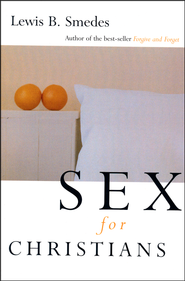 So what does all of this have to do with BDSM?
So what does all of this have to do with BDSM?
For starters, I agree with Lewis Smedes (Sex for Christians: The Limits and Liberties of Sexual Living) that pain and pleasure are often only separated by a knife’s edge. What one person experiences as unpleasant pain, another may experience as sexually arousing. Take Mary, for instance, for whom bondage may be physically and emotionally torturous, while it is highly arousing for Lisa, who doesn’t associate bondage primarily with pain, but with pleasure and trusting surrender. In other words, like with spicy food in world cuisine, it may be hard to come by a universally accepted definition of ‘pain’ in sex. But I’m jumping ahead.
Let me first clarify a few things conceptually. It seems to me that many Christians, who deride BDSM per se, assume that BDSM necessarily always involves excessive pain, grotesque humiliation, bizarre sexual perversions, and power differentials that, although consensual, builds a perception of inequality of BDSMers – including monogamous participants. Based on that assumed definition, it is understandable that most Christians recoil from BDSM, pointing out how it conflicts with a biblical view of healthy sexuality; a view I might add that rightfully affirms the inherent dignity, equality and value we have as God’s image-bearers. A view calling us to treat each other as such during sex. And they’re right.
Just because participants engaging in BDSM consensually agree to being hurt or humiliated, doesn’t necessarily make their pain or humiliation right or “good” – since painful sexual acts always leave residues and traces in our psycho-spiritual personas; unconscious residues that diminish and undermine our dignity. So I agree with most Christians that the S&M (sadism & masochism) aspect of BDSM certainly involves excessive pleasure in inflicting or receiving pain and humiliation, and thereby is prone to devalue human dignity and equality. It could actually be considered abuse in a number of cases. However, the cliché of the leather-clad dominant who derives sadistic pleasure from humiliating and inflicting pain on a consensual submissive impersonating an inferior doormat is not the only form of BDSM. If we strip BDSM of the S&M and retain the B&D (bondage & discipline) and D/s (dominance & submission), we may find that the sensual BD/s aspects of BDSM do not necessarily contradict biblical injunctions, if practiced within the safe and trusting parameters of a monogamous marriage.
Next time, John will answer the question of how some aspects of BD are beneficial to a couple, and you will hear my challenges with the dangers, artificiality and limits of this type of sexual play.
Questions? Ask them.
* not his real name
July 8, 2013
COUPLES Gathering
As promised last Friday, a photo journey through Soulation’s COUPLES Gathering.
Thank you, to each person who made this Gathering possible. We look forward to the talks, books, ideas, and souls that will take on a new life because you gave of yourselves.
July 3, 2013
Taking a Break
Don’t worry, it’s just for this week.
Due to the first COUPLES Gathering taking place in Steamboat Springs this Wednesday through Sunday, I will not be posting this week.
If you’re hungry for something new, take a look at this oldie but goodie:
Flat: Pre and Post Pregnancy Body
I hope to post a few pictures of our Gathering celebrating the 4th, working the land and hiking White Woods instead of my vlog this week.
Happy Independence Day Eve!
June 28, 2013
Who is the Weaker Brother?
With all the concern that a bikini might make my brother stumble, I decided to bring out my favorite Bible interpreter (who I happen to be married to). Watch Dale Fincher and I hash out the context and application of those significant passages to the modesty debate: 1 Corinthians 8 and Romans 14.
Follow Dale’s post about weaker brother and modesty at FreeAtLast.me (not .org). The best way to know what he’s working on is to follow @soulation or @dalefincher.
June 26, 2013
Play: Learning How
“The trick is not to arrange a festival, but to find people who can enjoy it.”
–Frederick Nietzsche.
I would rather write a post on how to get an article written, dinner finished, the plants watered, keep a three-year-old happy and be that adoring, sexy, strong, comfortable in your own skin wife than write a post about playing. I spend a lot more time figuring out the first list, not so much on the second.
For summer 2013, all Soulation’s writers are writing on play, how to do it, what it means, why it bothers and haunts and delights us. 
We’ve all got our strengths. Mine is not playing. I feel like a junior higher on the dance floor when I watch my husband and son kick and tickle and, well, play. I don’t know the steps. So I take pictures and put them on instagram, or I check my emails, or I make dinner.
Might as well get something done while they are playing.
What’s the point of playing, what’s the end goal? As soon as you tell me I’ll find a faster way to get there, like taking a walk pushing the chariot and listening to a lecture on resting.
Josef Pieper caught my eye two weeks ago when I found his very rare (very expensive) book, “What is a Feast?” holding his “Pascal Lectures on Christianity and the University”at the University of Waterloo. And while I do realize the irony of reading about feasting rather than having one, I found some ingredients that are giving me permission to practice play.

Sailing last weekend.
The ingredients of a feast:
a day of rest from utilitarian profit
a day of joy
Joy, according to Pieper, is “the possession or receiving of that which one loves.” But what if I love getting things done? (I just made kale chips and answered three voicemails–that gives me great joy.)
Play pushed me to practicing those loves that go deeper than crossing items off my list of to do’s (addicting though that may be).
I love sailing when there is nothing to do but hold on for dear balance.
I love reading poems at the end of hectic nights.
More recently, I love reading Harry Potter (3rd book–and do NOT spoil the ending for me).
I love writing poetry.
I love smelling the wind in White Woods in summer, clover and honey that intoxicated us to buy this parcel in the first place.
For you, dear friends, inspired by John 3:8 and the open window.
Get Ready
I wear a backpack of reasons
to steer clear of idleness.
The devil’s workshop, the threat
of poverty, the anxiety of boredom.
Outside my window,
the aspen knows how to play,
rustling with exuberance
her leaves unafraid
to fall
before their time.
Soon will crisp and fall
and crunch. Even their death
a playful pirouette to earth.
But the ant,
the ant that stores up for winter,
that the lazy must go to
observe
we are the ants of God’s army,
food storage for winter
trails of productivity
a earthen hill of home
to protect.
When did the Son of Man
play?
What prophet had the time
when lightening sat
poised and thousands
might die?
I cannot be the daisy-chainer
from Carmichael’s poem.
Souls are pitching
over the edge,
winter will come.
Are you ready?
Never, never,
never ready.
So, ready yourself
for the pitch of the wind
smell its kiss
on your husband’s skin
the honey
caught and thrown
from unfurling leaves.
Let the three-year-old choose
the path through the woods.
Make a tangle of the sheets
let the kale chips burn.
– White Woods, Summer 2013.
Postcript: This post was true play for me after a week of heavy modesty discussion over at “Is Itsy-Bitsy Wrong? Bikinis and Modesty“. However, the modesty quest continues at my husband, Dale Fincher’s blog, Six (Wrong) Assumptions from the Modesty Lifeguards. And stay tuned for my vlog this Friday, where I’ll interview Dale on the real meaning of ”Don’t cause your brother to stumble” passage (6/28, 10 am).
More Gems on PLAY from Soulation:
Did this post make you want more on PLAY? For the rest of this series, see below.
From BreakfastReading
Difference Between Doing and Being
Can You Play as Good as I Can?
What’s Work Got To Do With It?
From SturdyAnswers
From RubySlippers
June 21, 2013
Emerald City: Dr. Tina Schermer Sellers
Welcome to our first Emerald City.
You chose the questions Dr. Tina Schermer Sellers answered through voting in the comments at Modesty and the Emerald City (Where Tina gives my favorite definition of modesty):
What does sexual stewardship look like for both singles and marrieds – especially as it relates to desire, attraction and lust? How can we steward our sexuality better?
How can a single who is committed to celibacy outside of marriage more fully inhabit her/his sexuality in healthy ways?
Dr. Sellers, I have heard that people who lose their virginity at a later date (28, 30 +) the less likely they are to enjoy sex and the less often they will have sex. Is this true?
When you say modesty includes “not giving my body away” what did you mean? How is this negative definition helpful when so many women are afraid men already have power to take their bodies from them? Can you give a more positive addition with the same meaning?
Jonalyn, you mentioned in a post below (in reference to lust) that lust is “imagining sex with someone in a predatory manner involving (but not limited to) taking their body for imaginary use without interest of care for their soul.” What if you dream about having sex with a friend? You care about your friend, yet you want their body. Is that lust too? How do you equate that?
I’d also like to hear your and/or Dr. Sellers’ perspective on the idea that our beauty/modesty is for a spouse vs. for ourselves. For me, when it comes to dress, I generally don’t use “modest” as a descriptor because of the baggage I associate with the term. I like Situationally Appropriate, Comfortable, Attractive, Confident, etc. What we wear definitely reflects on us, but, to me, there is a vast difference between thoughtful image control and biblical prescription when it comes to covering our bodies or wearing pretty things or expressing ourselves through our appearance.
Click below to enter.
Highlights:
Dr. Tina Schermer Sellers refuses to box-up sexual stewardship with rules, her idea that modesty is nothing if not a place of power for ourselves, her word picture of the co-created dance of sex, the knowing laughter when we discover our body works.
You can find Dr. Sellars @TinaSSellers and blogging at Musings by Candlelight.
June 20, 2013
Is Itsy-Bitsy Wrong? Bikinis and Modesty
Photo credit: ReySwimwear.com”Who Says it Has to be Itsy-Bitsy?”
In response to the overwhelming request to reply to The Evolution of the Swimsuit by Jessica Rey, I offer you this vlog, one day early.
For more on the link between bikinis and enjoying your body, peruse comments of Modesty: Why Covering Up is Not the Answer
Learn about the connection between freedom, modesty and God’s love: Modesty and the Emerald City
Listen to Dr. Tina Schermer Sellers explain why her definition modesty tomorrow (6/21) going live at 10am, here at our first Emerald City.
Princeton Study on Men Viewing Women in Bikinis
The Most Memorable and Provocative Swimsuit in Hollywood: A One-Piece
The Male Mind by Dale Fincher
Sensuality at Jessica Rey’s site. I like it so much I might just buy one.
June 19, 2013
Secular Ministry: Undercover in America
I just returned from a week at Glen East, a workshop-based conference for artists. Fine-art master printmaker, Barry Moser, confessed in a vulnerable address that his Tennessee family forbade him from pursuing art. He figured God could only use him if he was a minister. So Moser took a detour as a minister (that destroyed his faith in the church) before he went on to become an artist.
Moser’s conviction that ministry pleased God more than fine art is precisely the kind of thinking that Soulation is working against. I once told a close friend that her husband’s work in graphic design for a commercial company was not less significant than the work I’m doing at Soulation. She disagreed.
“His work is really meaningless besides the paycheck it brings,” she said. “And he would agree with me.”
I could share some theology here, about working for the Lord, no matter what we do, about the priesthood of all believers. But the hierarchy which elevates “full-time Christian ministry” above lucrative, secular jobs is too pervasive to easily overturn. Instead, I have another strategy: telling the story of my friend and one of Soulation’s writers, L. James Everett III. For in stories we are invited to identify which is the root of change.
What Counts as Ministry?
 An adjunct professor of philosophy, L. James Everett III teaches with the cultural awareness of Hudson Taylor and the compassion of Mother Teresa in his Calcutta: the West Coast. Some days Everett teaches five classes across three different schools, sometimes requiring 15 hour days weaving the labyrinth of freeways to make every class in time. He talked with me about the most difficult days where he leaves at 5am and returns home at 11pm. He knows his culture, from the cleanest bathrooms, the 24 hour fitnesses, the coffee houses that can be found along his routes to the students’ skepticism about truth.
An adjunct professor of philosophy, L. James Everett III teaches with the cultural awareness of Hudson Taylor and the compassion of Mother Teresa in his Calcutta: the West Coast. Some days Everett teaches five classes across three different schools, sometimes requiring 15 hour days weaving the labyrinth of freeways to make every class in time. He talked with me about the most difficult days where he leaves at 5am and returns home at 11pm. He knows his culture, from the cleanest bathrooms, the 24 hour fitnesses, the coffee houses that can be found along his routes to the students’ skepticism about truth.
I’ve shadowed Everett during one of his grueling days of lecturing. Even with a Masters in Philosophy, I found myself taking notes, laughing over the way he played cat and mouse with his students. They know his classes take them beyond themselves. Because of his pioneering work in teaching, because Everett’s sacrifice goes largely overlooked as “secular work” (he has not and probably never will be commissioned by a church as a missionary), I asked Everett for an interview. I expect his story will push you to consider the creative ways Christians must re-approach our ideas of full-time ministry.
~~~~~~~
When we think of a philosophy prof we all have an image in our minds. I’m sorry to say, it’s not a very flattering picture. Could you share a little bit about the way you teach philosophy?
Can I just say that I cuss?
I’m really heavy-handed on confidence. The students like that their prof is so confident, so arrogant, so cocky about the fact that he is passing out wisdom. It really is wisdom. It’s not BS. And if you put your mind into it you’ll get something out of that.
I think a lot of philosophy profs would hesitate to do that.
I use a lot of humor. I’m very theatrical. I vary back and forth. Sometimes I like to personify the different theories (dualism, monism, atheism, theism), change voices. Sometimes I’ll work on identifying a voice during my drives. It will be so different from how I look that it will throw people. It will be someone’s voice, but not mine. Students have told me that just remembering the different voice helps them remember the different views within philosophy.
What is the best part of your job?
I get to be a part of people’s lives at a crucial stage in their intellectual and moral development as not only adults but as citizens. I’m trying to show my students how to be more informed, more engaged voters who can take charge of community, take responsibility for the shape and direction of their communities. For example, I like being present when students realize that there’s more to an issue than they thought, like abortion or same-sex marriage or whatever it is. That the typical little things they’ve heard don’t really fully capture the depth of the issue. They haven’t thought through it carefully enough. It’s nice to see that. I do not work in conservative places. These are some of the most liberal places in America. I get to see a newfound respect for tradition. Not just because it was tradition, but because sometimes folks got things right. And just because it’s old doesn’t mean it’s wrong.
The second best thing is getting to see spiritual awakening in some people. Very recently a student came back and asked what my religion was. I asked him why he was asking. I had told his class during the semester that I’d tell him afterwards if he still wanted to know. He said he was taking a world religions class and thinking of leaving his Catholic faith. I was able to sit down with him for a half hour or so and help him think through it.

Christopher Hitchens
At another time a group of atheists who for some reason love me, I don’t really know why. They came up to me during a logic class and they said I reminded them of Christopher Hitchens. I said, “Why would you think that?” They said,
“Because you’re witty and cynical and you’re a careful thinker. But we can’t figure out if you’re for or against anything: abortion, gay marriage, God. That’s actually why we like you, because you’re so hard to figure out and keep us thinking.”
Sometimes I drop a cuss word here or there, it’s never a throwaway, it’s always intentionally, to emphasize a point. I think its part of the undercover work I do. Sometimes I think swearing is one of the most appropriate ways to get a thought across. At least my students seem to think so. I try not to use the F bomb. But I’ve had to in rougher areas. For instance, at one college students regularly ask me to sign documents for their judge which allows them to remain in class and stay out of jail. Once at this college, I could feel the beginning of losing control of the class. I’d have to get angry and drop an F bomb. It always resulted in the complete and irrevocable surrender of the classroom.
Third is how my schedule changes every semester. I get bored easily and I can’t imagine sitting at a desk 8-5. I like being out and about. I get to see all parts of the cities, from the poorest to the richest, be around all sorts of people.
Over fifty years ago, Deitrich Bonhoeffer did undercover surveillance work even while he seemed to be working for Hitler’s regime. While there is not a Gestapo wanting to silence you, in what ways are you an undercover agent working in enemy occupied territory?
First, conservatives are so rare and wary, no one knows who they are. At one secular university where I teach, I’ve met an economics professor who is conservative, a libertarian. It’s a big deal. She’s been seared, she’s had to protect herself with attorneys, nasty stuff with unions. So in this primary sense, I’m a conservative because I’m a Christian, not the other way around. They’re linked in my mind. In philosophy there’s a “you have your beliefs, I have mine” approach. At some of the secular schools I teach at atheism is dominant. I do feel that my particular brand of Christian feels undercover.
Second, I sense that I’m on a comprehensive mission: spiritual, physical, economic. I feel like I’m a missionary for truth in all its dimensions. In teaching, I have a full-orbed missionary deal. Often, I feel like I’m sitting as a sheep in a den of wolves. I don’t wish anybody any harm, but I sometimes feel they wish me harm, and would wish me harm if they knew more about me.
Out of the 40 faculty that I get to interact with, I’ve met two Catholics whose view of God is similar to mine and one evangelical. While there are possibly others, we are a distinct minority.
So I’m holding my cards close.
~~~~~~~
Everett would be a star at a Christian university, he would be loved and groupie-ified. But Everett doesn’t work for Christian colleges alone, he works among several campuses where he is often the first to suggest wisdom is alive and well, that God may exist beyond wishful thinking and that beauty can show up in Philosophy 101.
Everett and I spoke further about what steered him into philosophy, the worst parts of his job and why adjunct work is as grueling as missionary work in Africa. If you care to hear more about this interview, ask in the comments.
And, I hope many of you will pick up on Everett’s belief that conservative thinking and Christianity are linked. If that bugs you, please ask. Finally, if you’d like to read more about how Soulation is re-defining what ministry and even church look like in the 21st century, read here.
June 14, 2013
Red Flags in Cross-Sex Friendships
Today’s Friday short is inspired by Stacie’s question:
I have been so interested in the topic of cross sex friendships. I have a few myself. I am a married lady with children and I have cultivated some good friends that are male. A couple are currently single young men and others that are the fortunate husbands of some of my dearest lady friends. After some contemplation and reading books such as ”loving your marriage enough to protect it”, I found myself curious to your perspective on a few things. While cultivating friendships with single young men in my church I have had a few eyebrows raised. At one point someone stated that my friendship ‘could’ be deemed inappropriate. I no longer hear those things. It seems to me that the longer my friendships with these men go the more others realize ‘oh, there really isn’t anything ‘going on’ there.’ I wonder though at the stringent rules that we are told to protect our marriages…yet I do think that fundamental guidelines are useful. That being said, I’m curious to hear your thoughts are things such as, a common marriage vow of forsaking all others (I heard this preached on as a reason against cross sex friendships), and rules of not ever allowing yourself to be alone with someone of the opposite sex even on a car ride? Because I have witnessed the heart break of what unfaithfulness causes in a marriage I can understand customized safe guards. I also have the knowledge and years of trust so solidly built in my marriage that I don’t feel a twinge of jealousy when my husband notices another’s beauty. I was hoping to start a conversation regarding the pitfalls and the freedoms that come from these enriching friendships. I have admiration and love for all these men in my life. You have had a couple of articles on this topic, yet I haven’t seen one yet handle any red flags of inappropriate feelings that could potentially arise… I’m very interested to hear your thoughts.
A few red flags and guidelines for cross-sex friendships:
June 12, 2013
Presuppose Love
I’m staying in an ancient dorm in Mount Holyoke College, western side of Massachusetts. For one week I am conferencing with other artists at The Glen Workshop East, sponsored by Image Journal. All morning I sit with poets and we discuss and critique our poetry. So far, I’ve found I can keep up with most of the ideas.
And I cannot wait to keep writing. Can you ask for more from a conference?
I felt more prepared for the week with creatives as my husband attended last year. But, I haven’t separated the experience of being here with what I will take away.
I can confess that I find it very hard to hold back the competitive side of me. I’m not wanting to compete with writing, in some ways amateurism is a very pleasant place. But, I do find myself wanting to spring on ideas I don’t agree with.
It’s the practice of avoiding the itch for closure, leaving the dangling thread. Reminds me of a post I wrote on the similarity between watercolor and friendship. We can over-work a piece, a person, an idea.
For the huntress in me, that’s not good news. I want to sniff out the source of the idea and run it down, yipping with exhilaration. I hope I’m not actually sniffing for blood.
I believe it’s truth I’m wanting. But in artist circles, acting like truth is as proximate as beauty seems unorthodox.
This is a week of study, of sitting to learn, so I’ve tried to stay off the stage. I’m listening during open mic night and I’m letting my poems be questioned and cut without jumping to explain. I’m finding good things in this process, the spiritual discipline of learning.
Martha Serpas reminded us at the end of our first morning together, “Presupppose love, as Kierkegaard said. Your reader is careful, have confidence.”
Here’s a poem that elicited some new awareness for me. I read it to our group this morning. Per their suggestion I’m trying to turn it into a sonnet.
As it is a work in progress I will presuppose your love, that you will lay your hunting horn down and care for these words.
Sunday Night
I am quieting myself
sipping the stillness of eve.
The lights are too high
the snow is too weak
to chill me to leave.
Wrapped in white
my third story bed lifts my head.
Even rest has an expiration date.
With the dawn’s crack,
the gauze lifts, I’ll unwrap.
Down I slip, almost glide
(You want eggs, sunnyside?)
Monday sizzles, “Real life
has begun.”
~ Holyoke, Massachusetts, June 11, 2013
Jonalyn Fincher's Blog
- Jonalyn Fincher's profile
- 9 followers



